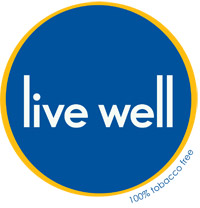Why pursue a tobacco-free or smoke-free environment?
In 2006, the U.S. Surgeon General stated that there is no risk-free level of second hand smoke. The current USEPA standard for daily average levels of outdoor air particulate pollution is 35 micrograms per meter cubed. We measured average particle levels near outdoor smokers of as much as 200 or 300 micrograms per meter cubed (Stanford Outdoor Tobacco Smoke Study, the results of which are presented in an article entitled "Real-Time Measurement of Outdoor Tobacco Smoke Particles", published in the May 2007 issue of the Journal of the Air and Waste Management Association.
It is consistent with LCC's mission:
Learning-centered & Life-skills development
LCC is committed to creating a learning-centered environment that equips students with the academic and life-skills necessary to succeed in today's workforce. In our community, state and nation more and more employers are recognizing the value of creating smoke-free environment indoors and out. In order to provide a healthier and more accessible environment for employees, customers, and visitors, an increasing number of public institutions and private employers have voluntarily decided to prohibit tobacco use on their property outdoors, including:
- All K-12 school campuses (mandated by state rule to be tobacco-free)
- All Oregon Department of Human Services properties
- Hospitals and Health Systems
- Peace Health (Sacred Heart Medical Center, Cottage Grove, Peace Harbor Hospital)
- McKenzie Willamette Medical Center
- Asante Health System
- St. Charles Medical Center (St. Charles and Mountain View Hospital)
- Salem Hospital (Salem Campus, West Valley Hospital)
- Oregon Health & Science University
- Silverton Hospital
- Columbia Memorial Hospital
- Mid-Columbia Medical Center
- BF Goodrich Tire Manufacturing
- Calgon
- Dow Chemical Company
- Eli Lilly and Company
- Johnson & Johnson
- Lowe's Companies, Inc.
- Nike, Inc
- Regence Group
- Scott Paper Company
- Union Pacific
Creating a tobacco-free environment helps prepare LCC students for future employment.
Core values:
Learning: Foster a culture of achievement in a caring community
- LCC is a leader in promoting the health and well-being of its students, faculty and staff. Creating a smoke-free campus further demonstrates that level of caring by supporting an environment that will help students and staff live longer and healthier.
Accessibility: Minimize financial, geographical, environmental, social, linguistic and cultural barriers to learning
For students with asthma or other respiratory conditions secondhand smoke on college campuses denies them access to the college. Toxic clouds of smoke in entranceways are equivalent to having no entryway at all.
Sustainability: Integrate practices that support and improve the health of systems that sustain life.
- Tobacco use is the leading cause of preventable death in the US and there is no safe-level of secondhand smoke exposure. Reducing tobacco use and exposure to secondhand smoke on campus clearly promotes health and quality of life.
- The creation of tobacco products is detrimental to the environment. The tobacco industry burns as much as one acre of forest for every acre of tobacco cured, using 12% of all the timber felled in the world. In addition, tobacco cultivation involves a great deal of pesticides. Fertilizers, herbicides and pesticides poison farm workers, seep into the soil and pollute waterways and ecological systems, and poison livestock and food crops.
- Cigarettes are one of the most littered items in America and the world. Cigarette filters are made of cellulose acetate and can take decades to degrade. Cigarette litter is not only unpleasant to look at, but the toxic residue in cigarette filters is damaging to the environment, and littered butts cause numerous fires every year.
- Creating a tobacco-free campus reduces cigarette waste as well as air pollution from secondhand smoke locally. It demonstrates active engagement in positively impacting the larger environment and adopting sustainable practices in order to ensure a viable and thriving college for generations of students to come.
Innovation: Act courageously, deliberately and systematically in relation to change
As stated on this website, LCC is a trend-setter – not a trend follower. Going tobacco-free is a growing trend among universities and community colleges. Including the following:
- North Arkansas College Arkansas
- University of Arkansas Arkansas
- Santa Rosa Junior College California
- Woodland Community College California
- Gainesville State College Georgia
- Southwest Georgia Technical College Georgia
- Indiana University – Perdue University Indianapolis Indiana
- Ivy Tech Community College Indiana
- Mercy College of Health Sciences Iowa
- Kennebec Valley Community College Maine
- Garrett College Maryland
- Delta College Michigan
- Ozarks Technical College Missouri
- St. Charles Community College Missouri
- Stanly Community College North Carolina
- Wake Technical College North Carolina
- Bismark State College North Dakota
- University of ND North Dakota
- Oregon College of Oriental Medicine Oregon
- Oregon Health & Science University Oregon
- Lander University South Carolina
- Northwest Vista College Texas
- Clark College Washington
- Western Technical College Wisconsin
LCC has the opportunity to be a leader in the state of Oregon by "courageously, deliberately and systematically" going tobacco-free.
And Strategic Directions
- Transforming the Learning Environment: Create, enhance, and maintain inviting and welcoming facilities that are safe, accessible, functional, well-equipped, aesthetically appealing and environmentally sound.
- A tobacco-free campus is more aesthetically pleasing, welcoming and accessible to all students, safer from fires, and environmentally sustainable.

